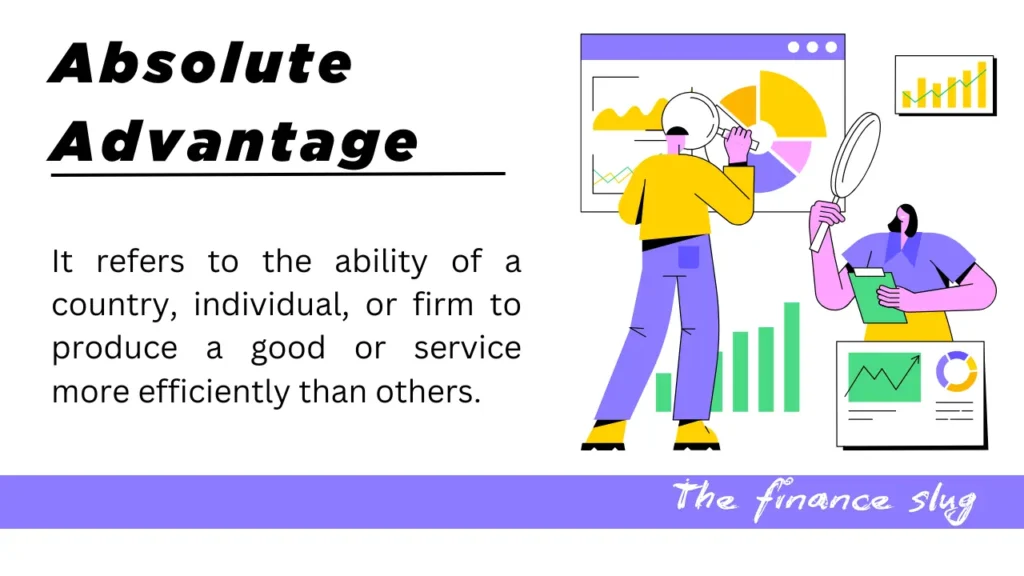Definition: Absolute Advantage is the ability of a country, firm, or individual to produce a good or service more efficiently than competitors using the same resources.
Origin: The concept was introduced by Adam Smith in The Wealth of Nations (1776).
In the world of international trade and economics, the term “Absolute Advantage” holds significant importance. Understanding this concept not only provides a deeper insight into global economic dynamics but also helps businesses and countries determine how to allocate resources efficiently. This article will delve into the meaning of Absolute Advantage, its examples, applications, and how it compares with other economic concepts such as Comparative Advantage.
What is Absolute Advantage?
Absolute Advantage is an economic theory introduced by Adam Smith in his seminal work The Wealth of Nations (1776). It refers to the ability of a country, individual, or firm to produce a good or service more efficiently than others. In simpler terms, a country has an absolute advantage if it can produce more of a good or service with the same amount of resources compared to other countries.
This concept focuses solely on productivity and efficiency. If one country or producer can make a good with fewer inputs (such as labor, raw materials, or capital) than another, it is said to have an absolute advantage. The advantage is purely quantitative—it’s not concerned with opportunity costs, which is the foundation of another important economic theory, Comparative Advantage.
Key Characteristics of Absolute Advantage:
- Efficiency: The ability to produce more with fewer resources.
- Output Maximization: Absolute advantage emphasizes producing the maximum possible output with the given input.
- Resource Allocation: This concept can be applied to both labor and capital resources across various sectors.
Examples of Absolute Advantage
To better understand Absolute Advantage, let’s look at a few real-world examples:
Example 1: Agricultural Production Between Two Countries
Imagine two countries: Country A and Country B. Country A has fertile soil and a favorable climate for growing wheat, while Country B has a better climate for growing rice.
- Country A can produce 100 tons of wheat per year using the same amount of labor and land that Country B would use to produce 50 tons of rice.
- Country B, in turn, can produce 200 tons of rice with the same resources Country A would use to produce 100 tons of wheat.
In this case, Country A has an absolute advantage in producing wheat, and Country B has an absolute advantage in producing rice. Both countries can benefit from specializing in the production of the good they produce most efficiently and engaging in trade with each other.
Example 2: Technology and Manufacturing
In modern times, technology companies are also good examples of absolute advantage. For instance, let’s say Company X in the United States is a leader in producing semiconductors, while Company Y in South Korea has a dominant edge in producing smartphones.
- Company X has an absolute advantage in the production of semiconductors because it can produce them at a lower cost and higher quantity than any other company.
- Company Y, on the other hand, has an absolute advantage in smartphone production due to its advanced technology and efficient manufacturing processes.
Even though these two companies specialize in different products, they can benefit from collaborating and trading their respective goods.
Absolute Advantage vs. Comparative Advantage
While Absolute Advantage focuses on which country or firm can produce more of a good with fewer resources, Comparative Advantage is a concept introduced by economist David Ricardo in the early 19th century. Comparative Advantage refers to the ability of a country or firm to produce a good at a lower opportunity cost than others.
Key Differences:
- Absolute Advantage is about sheer efficiency—producing more with fewer resources—while Comparative Advantage focuses on opportunity cost and relative efficiency.
- In the case of Absolute Advantage, one country might have an edge in producing both goods (e.g., wheat and rice), but with Comparative Advantage, both countries could still benefit by specializing in the good they produce with the lowest opportunity cost.
Why Comparative Advantage is More Significant in Trade:
Even if one country has an absolute advantage in producing both goods, both countries can still benefit from trade if they specialize according to their comparative advantage. This leads to a more efficient allocation of resources and maximizes global output.
Let’s illustrate this with a simple example:
- Country A is more efficient at producing both wheat and rice than Country B.
- However, Country A has a comparative advantage in wheat production because the opportunity cost of producing rice is higher in Country A than in Country B.
In this case, Country A would specialize in wheat, and Country B would specialize in rice. By trading, both countries end up with more of both goods than if they had tried to produce both themselves.
Applications of Absolute Advantage in Trade
Absolute Advantage plays a crucial role in international trade and economics. Let’s explore how it influences global trade dynamics:
1. Specialization and Efficiency
Countries that possess an absolute advantage in producing certain goods are more likely to specialize in their production. Specialization leads to increased efficiency, as countries can focus on what they do best and produce more output using fewer resources. This, in turn, benefits the global market by improving productivity and lowering costs.
2. Global Economic Growth
By focusing on their strengths and trading goods in which they hold an absolute advantage, countries can contribute to global economic growth. International trade allows nations to access goods and services they would not be able to produce as efficiently themselves, thus fostering economic interdependence and growth.
3. Resource Allocation and Economic Policy
Absolute Advantage helps policymakers determine which sectors to invest in or prioritize. For instance, a country with a significant advantage in agricultural production may choose to focus on improving its agricultural sector, whereas a country with technological prowess may prioritize innovation and manufacturing.
4. Market Expansion
Firms can use absolute advantage to expand into global markets. By offering products that are cheaper to produce, companies can create a competitive advantage in international markets. This is particularly important in industries where competition is fierce, and cost efficiency can lead to higher market share.
Benefits of Absolute Advantage
1. Increased Productivity
Absolute Advantage leads to increased productivity as countries and firms specialize in producing what they do best. Specialization allows for better use of resources, improved techniques, and more efficient production processes, ultimately resulting in higher output.
2. Better Standards of Living
Through international trade based on Absolute Advantage, consumers can access a wider variety of goods and services at lower prices. This boosts the standard of living by providing affordable products and improving access to foreign goods that might not be available domestically.
3. Economic Interdependence
The concept of Absolute Advantage promotes economic interdependence among countries. As nations specialize in certain goods and trade with one another, they become reliant on each other’s resources and capabilities, fostering global cooperation.
4. Competitive Advantage
For businesses, recognizing and leveraging Absolute Advantage in specific product markets allows for competitive pricing and increased market share. Companies that possess an absolute advantage can dominate their industries by producing goods at a lower cost and in higher quantities than competitors.
Conclusion
In conclusion, Absolute Advantage is a fundamental economic concept that has profound implications for both global trade and business strategy. By understanding which countries or firms can produce goods more efficiently, Absolute Advantage fosters specialization, productivity, and economic growth. While this concept is crucial, it should be viewed in conjunction with Comparative Advantage, which explains how trade can still be beneficial even when one entity has an absolute advantage in the production of all goods.
The practical applications of Absolute Advantage, from resource allocation to international trade, highlight the importance of efficiency and specialization in today’s interconnected world. As countries and companies continue to optimize their production processes, the principle of Absolute Advantage will remain a cornerstone of economic theory and global commerce.
What is Absolute Advantage in simple terms?
Absolute Advantage means being able to produce more of a product using the same resources compared to others. It’s all about efficiency and output.
How is Absolute Advantage different from Comparative Advantage?
Absolute Advantage is about producing goods more efficiently, while Comparative Advantage considers opportunity cost and focuses on producing what is most advantageous relative to alternatives.
Why is Absolute Advantage important in international trade?
It allows countries to specialize in goods they produce most efficiently, leading to increased global productivity and mutually beneficial trade.
Can a country have an Absolute Advantage in everything?
Yes, a country can have an Absolute Advantage in producing multiple goods, but trade is still beneficial when focusing on Comparative Advantage.
What are some real-world examples of Absolute Advantage?
Examples include Saudi Arabia’s efficiency in oil production and Brazil’s efficiency in coffee production due to favorable climates and resources.

Article Resources
- The Wealth of Nations by Adam Smith – The foundational text on Absolute Advantage. Read Online
- Principles of Economics by N. Gregory Mankiw – A comprehensive guide to economic principles. Find on Amazon
- Investopedia – Absolute Advantage – A simple explanation of Absolute Advantage. Read on Investopedia
- World Trade Organization (WTO) – Learn how trade policies impact Absolute Advantage. Visit WTO

